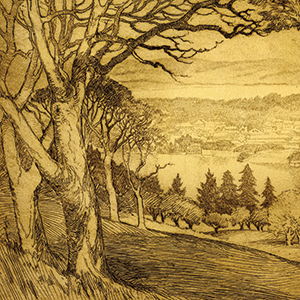

Tourists crowded the Monterey Peninsula this weekend. Unloosed from their large buses, they strode down Ocean Avenue to take photographs of themselves on Carmel Beach. They stood in pairs and quartets indecisively weighing the imperfections of one restaurant before moving on to disparage another.
Without asking permission, one woman plucked leaves and flowers from a local’s verdant garden. Beads of sweat ran down one man’s neck while he smoked a cigarette in the hot sunshine. He flicked the ash and then the butt onto the immaculate sidewalk.
Scenes like these don’t appear in the paintings of Pedro Joseph de Lemos (1882-1954). His version of California, as represented in Lasting Impressions of Pedro de Lemos at the Stanford Art Gallery, is a place of mythical beautya West Coast Avalon. Instead of people, his paintings, drawings and etchings are populated with trees. Cypress are bent and gnarled by the wind. Eucalyptus stand so tall their branches unfurl outside the top edge of the canvas.
No matter the variety, the trees flank each other companionably inside the pastel-colored landscapes. But even in an iconic block print like The Cliff Dweller, the ocean, however fragmentary, lingers in the background. Here, as in many of his prints, de Lemos includes the Pacific at the end of a curving trail, an elusive place in the distance. California is a symbol of the promised land, where you’ll find sandy beaches abutting an unblemished blue expanse, sun-flecked with gold. Swimming is the goal and it’s just within reach.
In 1917, de Lemos became the head of the Thomas Welton Stanford Art Gallery and the Cantor Center for Visual Arts (then the Stanford University Museum). This exhibit, which first opened in 2015 at the Monterey Museum of Art, marks the centennial of his appointment. While his tenure there lasted nearly three decades, he became a nationally regarded figure in the American Arts and Crafts movement. His expansive range of landscapes displays an enduring love of placehis family moved to Oakland in 1888 when Pedro was 6from Mount Tamalpais to Santa Barbara, the Dolores Mission in San Francisco, the Russian River, UC Berkeley and the Stanford campus.
In addition to the more than 70 works, Lasting Impressions includes a case filled with the tools of his etching tradegouges, pliers and carving knives. The vintage tools summon up, if not a lost art, then one that’s almost extinct. They’re reminders of what he could do with his hands. De Lemos gives each tree, with its twisted foliage, as much individuality as a person. Standing in the gallery, you can picture the artist putting his administrative duties to rest for the day and driving down the coast to set up an easel along the shoreline.
He’s there at the top of the hill sketching The Path to the Sea. Or experimenting with his palette for Old Pines at Monterey with three distinctive blues, patches of red flora and several shades of green that all remind us of perfect summer days on an uncrowded beach. But de Lemos, alongside many other artists, did his job too well. He mapped out the serenity of these places with reverence. His work invites the viewer in to explore every inch of California’s sand dunes, seashores and lavender-scented nightscapes. He couldn’t have anticipated the responseeveryone in the world has accepted his unconscious offer to claim these once secluded, now imaginary, lands as their own.
Lasting Impressions of Pedro de Lemos
Thru Dec 3, Gallery Hours
Stanford Art Gallery
art.stanford.edu


